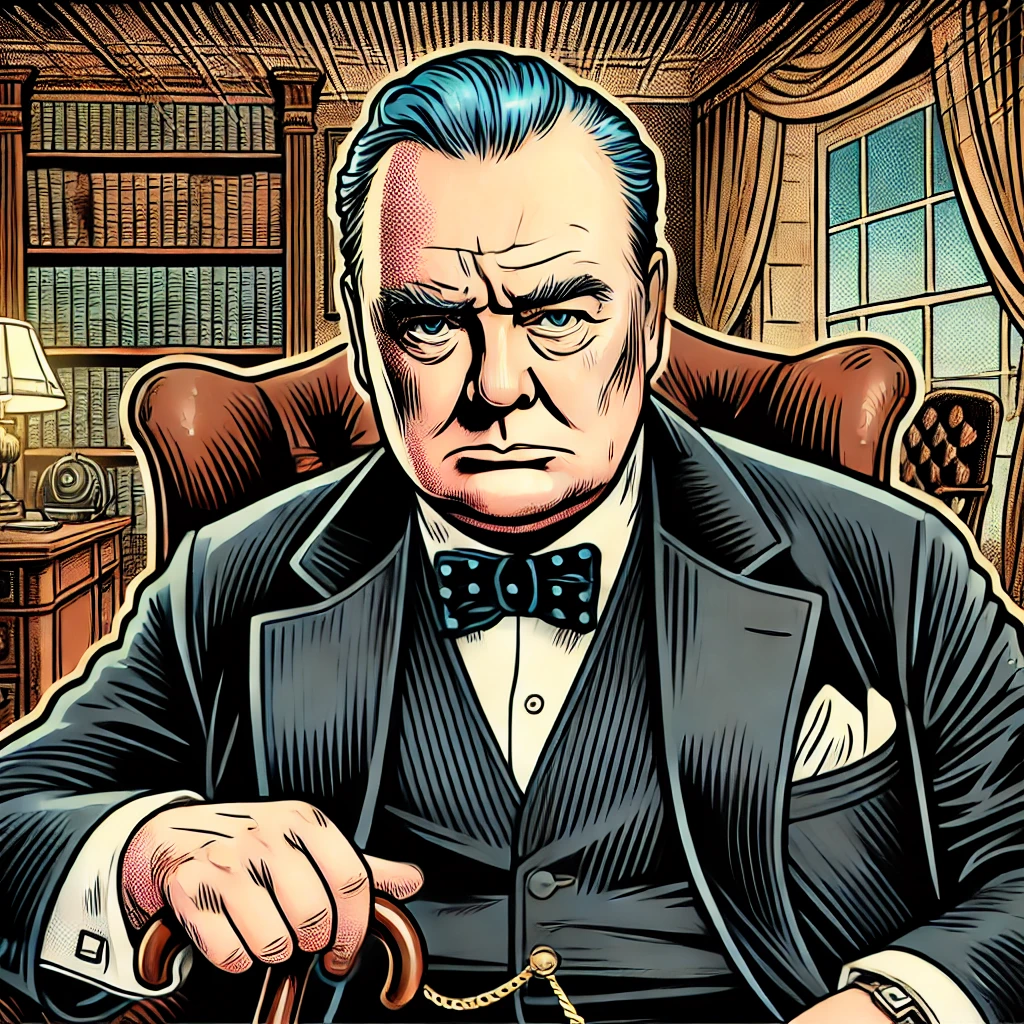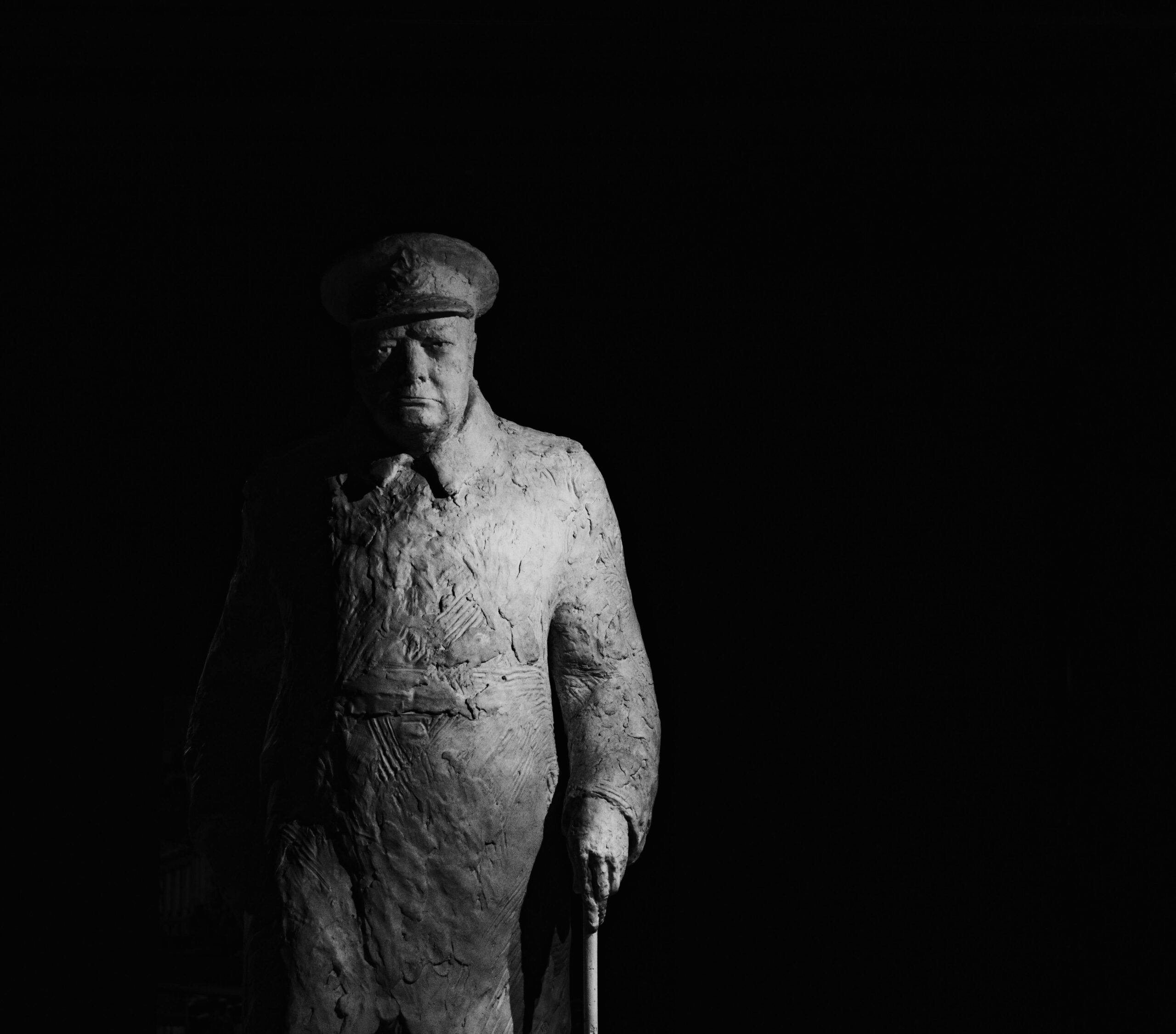Winston Churchill (1874–1965) was a British statesman, military leader, writer, and orator, most famously known for leading the United Kingdom through World War II. He served as Prime Minister of the United Kingdom during two critical periods: from 1940 to 1945, during the height of the Second World War, and again from 1951 to 1955.

Table of Contents
Dive into the timeless wisdom of Winston Churchill, a figure synonymous with resilience, leadership, and eloquence. This blog post explores 15 Winston Churchill Quotes, each a beacon of inspiration, reflecting the depth of his experiences and the strength of his character. Churchill, a Nobel Prize laureate in Literature and the indomitable Prime Minister of the United Kingdom during the critical years of World War II, left an indelible mark on history not just through his actions but also through his powerful words.
From the stirring speeches that bolstered a nation’s morale to insightful observations on democracy, responsibility, and human nature, each quote is accompanied by a unique background story, providing context and a deeper understanding of his remarkable perspective. Whether you’re seeking motivation, guidance, or a fresh outlook on life’s challenges, Churchill’s enduring words resonate with relevance and profound wisdom. Join us as we delve into the legacy of a man whose courage and wit shaped the 20th century, offering timeless lessons for today’s world.
15 Timeless Winston Churchill Quotes
Early Life and Career:
Born into an aristocratic family, Churchill was the son of Lord Randolph Churchill, a prominent Conservative politician, and Jennie Jerome, an American socialite. He attended the Royal Military Academy Sandhurst and served as an officer in the British Army, participating in various military campaigns, including in India, Sudan, and South Africa during the Boer War.
Churchill began his political career as a Member of Parliament (MP) in 1900, initially as a Conservative, but he later switched to the Liberal Party in 1904 over differences in policy. He held various key government positions, including First Lord of the Admiralty (1911–1915), where he played a major role in the development of the Royal Navy. His career, however, was marked by controversy, particularly during World War I, when his involvement in the ill-fated Gallipoli campaign led to his temporary political downfall.
1. “We shall fight on the beaches…”

Part of a speech delivered in the House of Commons on June 4, 1940. It was a defiant speech during World War II, assuring the British public of their commitment to fight Nazi Germany.
2. “Success is not final, failure is not fatal: It is the courage to continue that counts.”

This quote reflects Churchill’s resilience and perspective on success and failure, embodying his spirit during the challenging times of war.
3. “Never in the field of human conflict was so much owed by so many to so few.”

From a speech in August 1940, honoring RAF pilots during the Battle of Britain.
4. “You have enemies? Good. That means you’ve stood up for something, sometime in your life.”

This quote emphasizes the inevitability of making enemies when taking a stand in matters of principle.
5. “History will be kind to me for I intend to write it.”

Reflects Churchill’s awareness of his significant role in history and his contributions as a historian.
6. “If you’re going through hell, keep going.”

A motivational quote often attributed to Churchill, encouraging perseverance through tough times.
7. “Democracy is the worst form of government, except for all the others.”

From a House of Commons speech in 1947, highlighting his views on democracy.
8. “To improve is to change; to be perfect is to change often.”

Reflects his philosophy on continuous improvement and adaptation.
9. “The price of greatness is responsibility.”

A statement that underscores the burden and responsibilities that come with power and leadership.
10. “Kites rise highest against the wind, not with it.”

This metaphor illustrates the concept of overcoming adversity.
11. “Attitude is a little thing that makes a big difference.”

This quote, often attributed to Churchill, emphasizes the importance of attitude in facing life’s challenges.
12. “The best argument against democracy is a five-minute conversation with the average voter.”

A wry comment on the nature of democracy and the discernment of voters.
13. “Courage is what it takes to stand up and speak; courage is also what it takes to sit down and listen.”

Reflects his views on the importance of both speaking out and being willing to listen.
14. “A pessimist sees the difficulty in every in every opportunity; an optimist sees the opportunity in every difficuilty.”

This quote highlights Churchill’s optimism and how he viewed challenges.
15. “History is written by the victors.”

A statement reflecting his belief that the winners of conflicts shape historical narratives.
Key Achievements and Accomplishments:
- Leadership During World War II:
- Churchill’s most significant achievement was his leadership of Britain during World War II. When he became Prime Minister in 1940, Nazi Germany had already begun its expansion across Europe, and Britain stood almost alone against Adolf Hitler’s regime. Churchill’s speeches and determination galvanized the British people and helped maintain morale during the darkest days of the war.
- His famous speeches, like “We shall fight on the beaches” and “Never in the field of human conflict was so much owed by so many to so few,” rallied both the British public and their allies.
- Churchill played a key role in forming alliances with the United States and the Soviet Union, which eventually led to the defeat of the Axis powers.
- The “Iron Curtain” Speech:
- After World War II, Churchill’s “Iron Curtain” speech (1946) warned about the growing influence of the Soviet Union in Eastern Europe and the potential for a new conflict between the West and the Communist world, effectively laying the foundation for the Cold War.
- Nobel Prize in Literature:
- Churchill was not only a politician but also a prolific writer. He won the Nobel Prize in Literature in 1953 for his historical writings, especially his multi-volume history of World War II and his biography of his ancestor, the Duke of Marlborough. His writing, including his speeches, is considered some of the most powerful and enduring in the English language.
- Rebuilding Post-War Britain:
- After the war, Churchill’s government helped guide Britain through post-war reconstruction. Although he was voted out of office in 1945, he returned as Prime Minister in 1951 and oversaw a period of recovery, dealing with the decline of the British Empire and the rise of the United States and the Soviet Union as superpowers.
- Advocacy for Democracy and Liberty:
- Churchill was a staunch defender of democracy, freedom, and individual rights, and his opposition to fascism, communism, and totalitarianism defined much of his political career. He was a strong advocate for the independence of nations and the preservation of the British Empire.
- Social Reforms:
- Churchill was also a key player in domestic reforms, especially during his early years as a Liberal politician. He championed social welfare reforms, including the introduction of unemployment insurance, and worked on labor reforms aimed at improving conditions for workers.
Legacy:
Winston Churchill remains one of the most significant figures in British history and global politics. He is remembered for his remarkable leadership during WWII, his unwavering spirit in the face of adversity, and his eloquent oratory. His legacy as a defender of liberty and democracy, and his foresight in recognizing the dangers of totalitarianism, continues to shape the world today. He is widely regarded as one of the greatest British leaders of all time.
Churchill passed away in 1965 at the age of 90. His funeral was attended by leaders and dignitaries from across the world, reflecting the profound impact he had on the 20th century.
Conclusion
In conclusion, Winston Churchill’s legacy extends far beyond the battlefields of World War II; it permeates through the very essence of leadership, courage, and human resilience. The 15 Winston Churchill Quotes explored in this blog embody not just the spirit of a great leader but also the universal truths about life, struggle, and perseverance. Churchill’s words continue to inspire and guide us, serving as a powerful reminder of the strength that lies in determination and the power of a positive outlook. As we navigate the complexities of the modern world, these quotes offer a timeless source of wisdom and encouragement. They remind us that, in the face of adversity, the courage to continue is paramount. Whether you’re a history enthusiast, a student of leadership, or simply in search of inspiration, Churchill’s enduring words provide a rich source of guidance and reflection. Let these quotes be a beacon, illuminating your path with the wisdom of one of history’s most influential figures. Remember, as Churchill himself said, “Success is not final, failure is not fatal: It is the courage to continue that counts.” Carry these words with you as a source of strength and inspiration in your own journey.
